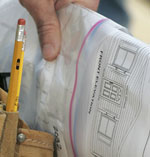Progress Payments
You can stay within your budget if you manage your progress payments
to your contractor carefully and it will ensure the building schedule and building quality is to your satisfaction.
Substantial upfront payments should never be made!

Do not listen to long explanations on why money is needed for materials etc. even and especially if the contractor was the lowest bidder. If they can not manage their cash flow, you have little chance of them managing your project effectively.
At most, upfront payments must be limited to the value of the materials delivered to the work site. In many states the limit for upfront payments is 10% of the total contract fee.
Construction payments can be made at pre-determined stages but should only cover materials and work supplied, to the extent that neither the homeowner nor contractor is at a big disadvantage.
Visit our main Contractor page for links to all the related information and free legal forms for general contractors.
Payments should be made in accordance with the bill of quantities and the construction schedule so that both parties are clear as to what has or has not been paid for.
Get receipts or an unconditional waiver and lien release (that indicates the contractor, sub-contractors and suppliers have been paid for work and materials) at every progress payment and prior to the final payment.
This is very important and protects you against any mechanic's liens or other claims being filed against the property, which may result in your having to pay twice. Check with your local authorities on the applicable laws!
Retention monies should be withheld and can be from 5% to 20% of the contract value - held from 3 months to 1 year, dependent on the type of works.
Crucial Stages for Progress Payments

If progress payments are for a major phase of the work it should not be paid until the work has passed all inspections needed e.g. prior to pouring concrete foundations, the applicable building department has to do an inspection and signing off.
By the same token your final payment should only be made after you received a final approval or clearance document from the relevant governmental building department.
If you have to make a payment in cash, it is best to make it in the presence of a bank officer and get an affidavit from the contractor as proof of payment.
Any operating manuals or maintenance instructions should be handed to you prior to final payment.
Final payment must be withheld until all items on your snag list have been addressed.
It is quite often the little fiddly bits that can cause the most frustration: a cracked tile that needs replacement or paint residue that has not been properly cleaned off etc.
Even more so when the sub-contractors have moved on to another job and it has now become a mission to get them back on site.
Agree on a reasonable time with the contractor for this to be carried out so as to avoid frustration and disputes.
Progress payments during your remodeling or construction works will go a long way in controlling your budget and keeping the contractor on his toes.
Most importantly: Get all final lien waivers and a signed copy of the final invoice stating that the contract has been paid in full.
You may be making payments to an Independent Contractor such as a programmer or draughtsman, which should be clearly detailed in your contract. Review our guidelines forindependent contractors.
The contractor agreement stipulates the manner in which progress payments will be made. Refer to our general contractor page for an overview of the construction process.
You are here:





